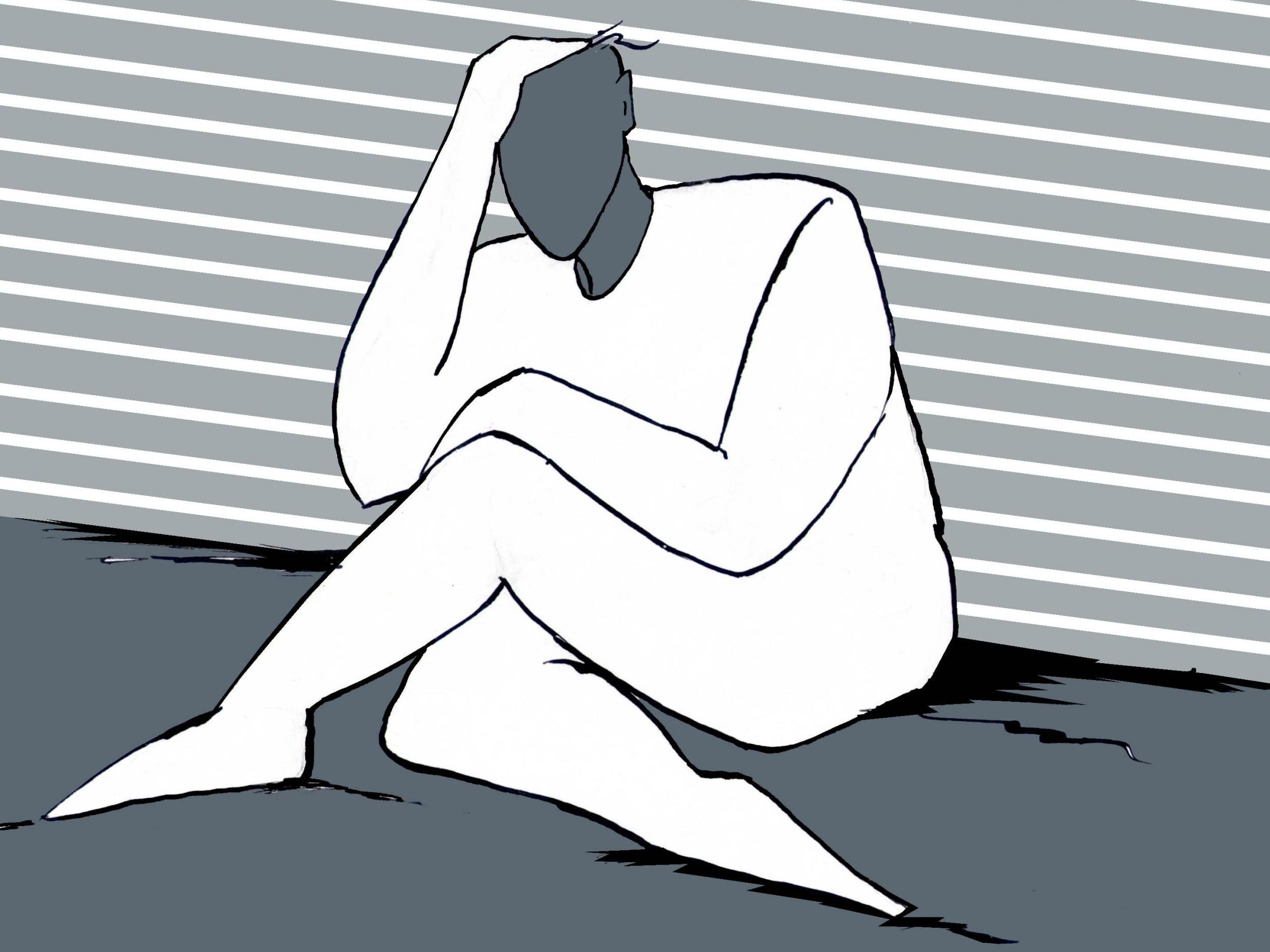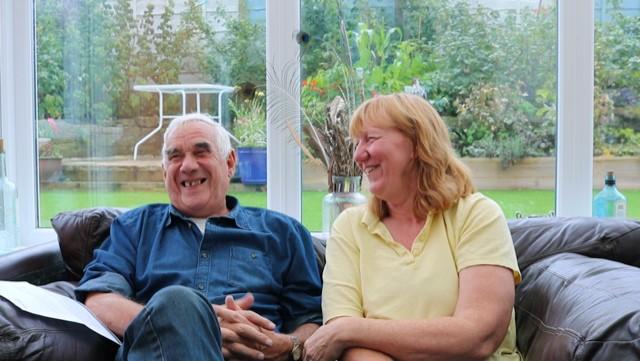‘He is losing his connection to the world’: Caring for someone with dementia during a pandemic
The coronavirus lockdown is difficult for everyone to comprehend but for those with dementia it can be impossible. Sophie Gallagher talks to the families struggling to provide 24/7 support or unable to visit loved ones in care homes


The first time Estelle Clarke, 28, really noticed her dad’s forgetfulness was when he couldn’t remember the word for hedgehog, instead describing it as the spiky animal in the garden. Phillip Clarke, 60, was officially diagnosed with frontotemporal dementia four years ago, although the family suspect he had it for many years prior. He is still able to do physical things for himself like get dressed or make a cup of tea, but wife Tracey, 58, has become his primary carer at their home in Derbyshire, which they share with 33-year-old son Scott.
Estelle normally visits at the weekend and takes her dad to a sweet shop where he picks out his favourite treats, but since the lockdown began on the 23 March, she has been unable to visit and instead relies on video calling. She tells The Independent that the coronavirus pandemic has had a visible impact on her dad and his illness not least because it disrupts his routine and requires him to remember new rules, which he quickly forgets.
“He loves going to the supermarket and chatting to everyone but now he has to do social distancing and once when he forgot another shopper got angry at him for not staying two metres apart,” she says. He also struggled seeing newspaper coverage of panic-buying toilet roll, which made him confused. “He does seem more confused in general in lockdown. It upset me when he asked about my dog (I have a cat), he also forgot the name of his own cat, Magic.”
While the lockdown continues the family is just trying to keep Phillip busy with gardening or painting and decorating, but Estelle says sometimes he will escape and walk up the road while his wife is busy. “My mum tries to explain to him what is going on but he doesn’t really understand because he lives in his own world.”
Comprehending a global pandemic, which has so far seen 3,000,000 people worldwide infected with Covid-19, a rising death toll at 211,000, and the enforcement of a nationwide lockdown is the stuff of confusing, dystopian nightmares for everyone. The impact of coronavirus and lockdown on mental health has been well documented: a survey by the Mental Health Foundation concluded 25 per cent of people are experiencing loneliness, the ONS reports nearly half of Brits are suffering “high levels” of anxiety and for those on the frontline the impacts are even more extreme as experts warn of long-term PTSD for key workers.
But what about for those whose illness can make understanding even basic tasks a challenge? Dementia, the NHS says, is the decline of brain function, which affects, among other things, memory loss, understanding, judgement, and mood. For many of the 850,000 people in the UK who have dementia, according to the Alzheimer’s Society, this manifests as forgetfulness, confusion and requiring assistance to varying degrees, particularly as the disease progresses. And when your brain struggles to process day-to-day normality, the current situation is unimaginable.
For Estelle and her family having a routine helps to manage Phillip’s illness but as the lockdown has thrown all plans up in the air, they are struggling to cope with the new normal. Annie Scanlon, 25, from Hampshire has been having a similar problem with her father Paul, 55, who has had dementia since 2013. Paul’s dementia is more advanced and he cannot remember names, sometimes he forgets faces too.
Pre-lockdown Paul was kept busy with walking the dog and doing small tasks like going to the shops with someone, but now he is more limited in his freedom. “He doesn’t understand the coronavirus at all, he doesn’t know why he isn’t allowed to the shops, why he can’t do the ‘normal’ route with the dog and stay away from people. We have to constantly remind him to move over or move him ourselves.”
Annie says that Paul has also been particularly worried about the family having not enough bread to eat. “He eats so much of it but now that we aren’t allowing him to go to the shops he constantly talks to himself and mum about needing to go and buy more bread.”
It’s not a holiday because there’s no end in sight, we’re prisoners without parole..."
The family is also missing the respite of Paul’s mother and sister coming to visit, as well as his two professional carers who normally come (they both have underlying health conditions so are shielding themselves). “During this time there really is no break from it all and it takes its toll on the family,” says Annie. “The mental strain that this illness puts upon the families is heartbreaking and it has shattered my family into pieces”.
For Liz Brookes, 64, from Rochdale, looking after husband Mike, 77, an RAF veteran who has had vascular dementia for nearly a decade, has been particularly difficult in lockdown because she is doing it alone. Normally the pair have a busy social life, doing activities like coffee mornings, breakfast clubs, choir or exercise classes every day. “All this has stopped since lockdown,” says Liz. “It’s not a holiday because there’s no end in sight, we’re prisoners without parole.”
Although people with dementia aren’t specified in the government’s list of vulnerable people who need to socially shield at home for 12 weeks, many sufferers will fall under the categorisation of over 70 (only 5 per cent of people with dementia are under 65 according to Alzheimer’s UK) or have underlying health conditions so will need to be at home as much as possible anyway. In addition, clubs like those attended by Liz and Mike have been forced to close down so even if they could leave the house they would have nowhere to go.

Liz says the diminished social contact has not only been hard for her but has caused noticeable differences in Mike’s behaviour. “He is not as able as before, he seems disoriented and the difference is quite striking. He seems like he’s losing that connection to the world,” she says. Unlike other people we spoke to Liz says although Mike doesn’t fully understand what is happening, he is aware of the gravity of it. “He was an avid newswatcher but I’ve had to limit the amount, after one news item I found him in tears and frightened out of his wits”.
Liz has also stopped going to the supermarket (she last went 5 weeks ago) – as she is worried about bringing the virus home – so is relying on friends to be fed. Carole Johnson, 55, from Manchester, whose 80-year-old mum with vascular dementia lives with her, also says one of the biggest challenges is the mental responsibility of being the person to leave the house and risk bringing the virus back.
For others the difficulty isn’t coping alone with your loved one, it is learning to cope without them. Across the UK people are being kept from family but for those with dementia it is much harder to explain your absence: Tracy Milton, 51, from Devon has been visiting her mum, Irene Pattemore, 90, in a care home since 2019. Normally she visits 2-3 times a week and speaks to her on the phone twice a day but since the lockdown she has been unable to visit.
“She thinks there is a ‘nasty virus going around’ but I haven’t explained how serious it is as I don’t want her being anxious,” says Tracy. “She watches the TV all day but she doesn’t take in what she is watching.” The staff at the home have also explained to residents what is happening but Tracy asked them to downplay it because she is so worried about upsetting her mother.
“Each time I speak to her I say I’m sorry I can’t visit and I love and miss her, and then she says ‘when will you be here’ and it breaks my heart.” Tracy takes reassurance from the staff who she says are giving Irene the best care and have provided her with an iPhone to make calls.
For the foreseeable future though Tracy, like many others around the UK, does not know when she’ll next get to see her mum. With countries around Europe like Germany and Denmark starting to lift lockdown restrictions there seems to be light at the end of the tunnel. But for those caring for relatives with dementia it is unclear whether the short-term adaptations that were necessary to protect them from Covid-19 will have caused irreversible change.
If you need support looking after someone with dementia you can call the Dementia Connect support line number on 0333 150 3456. You can also donate to the Alzheimer’s Society emergency Covid-19 appeal.
Join our commenting forum
Join thought-provoking conversations, follow other Independent readers and see their replies
Comments